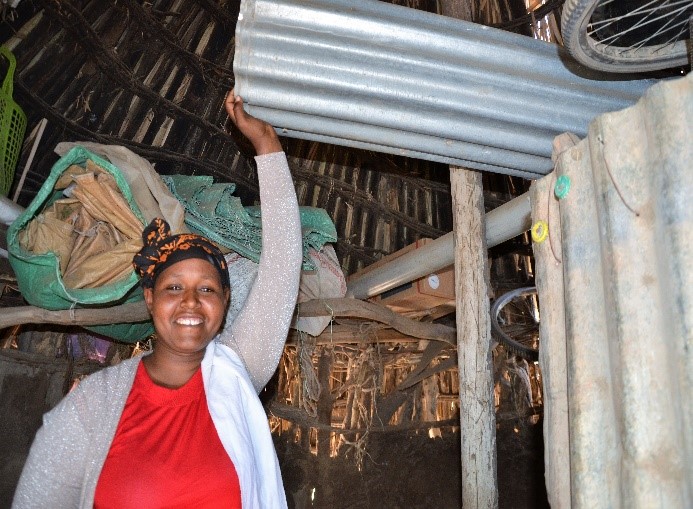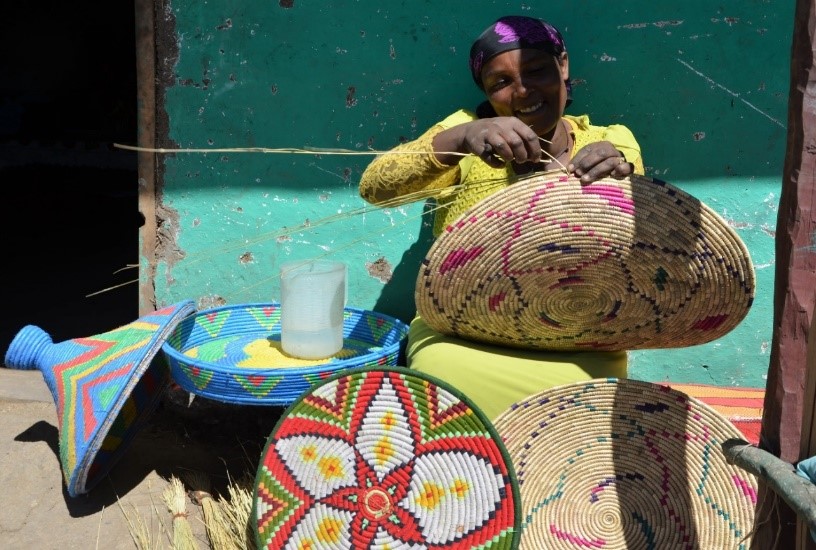Rural women in Ethiopia get involved in income generating activities
Date:
Mrs. Kebela Gure, is a 30 - year old wife and mother of five from Adamitulu District, Oromia region in Ethiopia. She dropped out of school in 8th grade to work and financially support her family. Mrs. Gure’s key priorities are to give her children a good education and improve her family’s livelihood.
In Dodola District, still in Oromia region, is a 38-year old Mrs. Teletech Bekelpe. Her husband’s sudden death forced Mrs. Tadelech, who was financially dependent on him, to work harder than ever before. She now must provide for her seven children. This stirred her to get involved in various small income generating activities - like distilling and selling Araka- a traditional alcoholic drink, hand weaving traditional baskets for sale, doing people’s laundry and even rearing chicken - which are all very labour intensive and brought in little income.

Mrs. Kebela shows the 20 corrugated iron sheets she purchased to build the house in the rural town.|Photo credit: UN Women, Fikerte Abebe
Supported by the governments of Sweden, Norway and Spain, Mrs. Kabele and Mrs. Teletech are among the beneficiaries whose lives have changed for the better after the introduction of Ethiopia’s joint programme on accelerating progress towards the economic empowerment of rural women. This was made possible through the Sustainable Development Goals Fund, the joint programme that aims at securing rural women’s livelihoods and rights in line with Ethiopia’s Growth and Transformation Plan.
Through the programmes’s loan provision and technical support, Mrs. Kebela started to get involved in diversified income generating activities. Using part of her income, she purchased 20 iron sheets worth 2,600 Birr (USD 118) to build a house in a nearby rural town, so her children can get access to high school education and beyond. “After I received over 6,200 Birr loan last year, I hired one-hectare land for 2,000 Birr. I purchased 2 quintals of the improved wheat seeds and sowed. From the sale of the harvested wheat to the Meki Batu Buyers and Sellers union in my village, I earned 17,000 Birr,” explained Mrs. Kebela. This encouraged and empowered her to get involved in other income generating activities.
Similarly, Mrs. Tadelech received training on income generation and a 6,000 Birr (272USD) loan. “Six month ago, I received 6,000 Birr (272USD) from the joint programme. I bought 6 sheep worth 4,200 Birr and purchased nutritional livestock feed. Currently, one of the males, which I purchased for 600 Birr is ready to be sold for 1,400 Birr for the up- coming Ethiopian Christmas holiday market. Two of the females are pregnant and are expected to give birth after a month,” she explained happily.

Mrs. Tadelech weaving her hand-made baskets.|Photo credit: UN Women, Fikerte Abebe
According to Mrs. Tadelech she currently has 2,000 Birr saved in a bank account. This includes the income from previous sheep sales and savings from the handwoven baskets and sale of Araka. “When I earn the 1,400 Birr from the sale of the sheep for the Christmas market, I will purchase another sheep to fatten. I will save the remaining money for my long-term plan of opening the retail shop. This will enable me to continue producing handwoven baskets whenever I don’t have customers to serve and to continue earning from it. The income ranges from 100 Birr to over 1,000 Birr per piece based on the size and the style.”
Before the RWEE JP’s support, transportation for water, grain and the family members were among the key challenges that women in the region encountered. Besides lessening the hardship that the families used to face, they now have various sources of income. With over 2000 direct beneficiaries, who are also members of Rural Saving and Credit Cooperative Organizations, the joint programme on accelerating progress towards the economic empowerment of rural women is making a difference to more than 14,000 family members, and indirectly benefitting 32,000 (17,000 female and 15,000 male) community members.
The programme capitalized on the participating UN agencies’ mandate and comparative advantage to generate more lasting and wider scale improvement in the livelihoods and rights of rural women. It is established to work on four specific outcomes; improvement of rural women’s food security and nutrition, increasing of their income to sustain their livelihoods, enhancement of the rural women’s leadership and participation in their communities’ development and to secure a more gender-responsive policy environment for economic empowerment of the rural women.